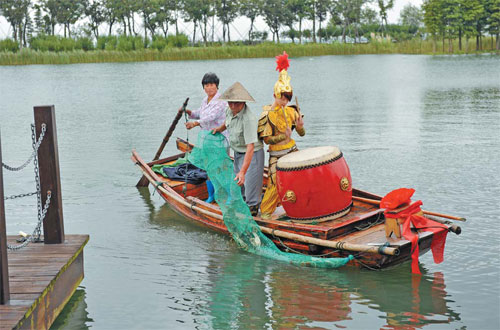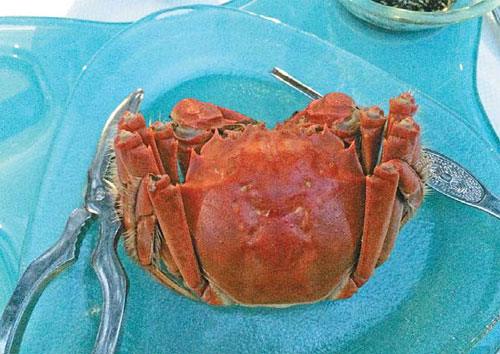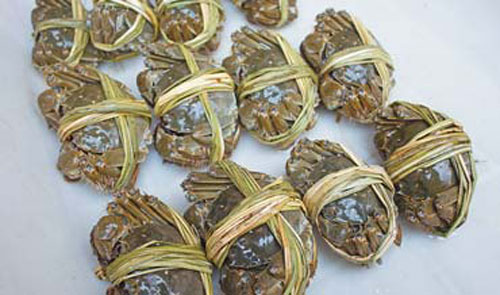A seasonal preoccupation
Updated: 2014-10-06 08:24
By Pauline D. Loh(China Daily)
|
|||||||||
A few decades ago, the hairy crabs of Yangcheng Lake were abundant, wild and free. Today, they are mostly bred in captivity and eager gourmets place orders before the season even begins. Pauline D. Loh traces the genesis of this culinary obsession.
They are a curiosity - fresh-water crabs with claws coated with a pelt of "hair". Because of that, eriocheir sinensis is also known as the mitten crab. It is a seasonal phenomenon and a food fad that has become an environmental concern.
Pollution is the main problem. When the crabs were still a part of the natural ecosystem, they foraged among the weeds and aquatic plants of the lake, finding their own place in the food chain.
Today they are bred in enormous numbers in closely guarded rafts with cages suspended in water. Captive, they can no longer look for food on their own, so they are fed pellets of formulated feed.
It is this feed that is muddying the waters, raising environmental and food safety concerns.
"Of course we worry about what is happening to Yangcheng Lake. Some unscrupulous people feed the crabs stimulants to make them grow faster and the uneaten pellets dissolve and pollute the lake," says Song Ping, 37, a villager who has lived in Kunshan, Jiangsu her whole life.
Her family has been lakeside smallholders for three generations and she now helps at an organic farm run by the Kunshan county government.
Song says when she was a child no one paid much attention to the hairy crabs. They were the fattest with milt and roe after the Mid-Autumn Festival around mid-September.
Local farmers and fishermen ate them before they became such a national obsession, but without much enthusiasm.
"There were better things such as our famous mandarin fish and the little yellow croakers. We didn't need to eat the crabs," she recalls.
She still cannot believe that people will pay so much money for hairy crabs.
From days of yore, the crabs of Yangcheng Lake appealed only to those with time, like poets and scholars, and the very rich.
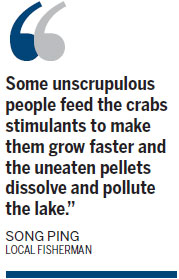
The crabs were valued mostly for a single mouthful of fragrant roe, because they really had very little meat compared to the more robust mud crabs from the sea.
Hairy crabs were seasonal food to be enjoyed with osmanthus wine when the harvest moon was high and when gardens were scented with chrysanthemums.
Their modern renaissance began in the 1980s, after leader Deng Xiaoping's historical push for China to transit from a planned to an open economy.
Hong Kong, well-known as a gourmet hub in the forefront of food trends, started paying big bucks for genuine Yangcheng Lake hairy crabs, a fad started by the growing number of mainland Chinese officials and businessmen from the Jiangsu-Zhejiang area who were based in the then-British colony.
Perhaps they were homesick for a taste of home.
Other Southeast Asian cities with large ethnic Chinese populations such as Bangkok and Singapore soon followed, with supply mainly channeled through the international hotel chains.
In the years that followed, the trend came back full circle, fueling demand in the place of origin.
Yangcheng Lake became famous for these seasonal delicacies, and every year from September to November. the lake district turns into a culinary mecca for hairy crab lovers.
It also changed the lives of Yangcheng Lake farmers and fishermen.
In no more than 10 years, the voracious crowds had eaten the crabs almost out of existence, and farms could no longer supply growing demand with truly local crabs.
To keep a good thing going, farmers started bringing in stock from other parts of the Jiangsu-Zhejiang area, including baby crabs caught off Chongming Island in Shanghai, and the greater Taihu Lake area.
Zhang Dawei, 50, is currently a cab driver in Shanghai, but his family still breeds hairy crabs on Chongming Island in the rural suburbs of the municipality where they have a two-hectare farm.
"We used to go out and catch baby crabs around late March and early April. We would sell them to the Yangcheng Lake farmers for 8 yuan each. That was about 10 years ago," Zhang remembers.
The golden era ended when the government set up a research farm in Zhejiang that concentrated on breeding hairy crabs and selling baby stock to farmers for only about 3 yuan apiece.
"There are no more real Yangcheng Lake hairy crabs. It's too expensive to rent a raft of cages there," Zhang explains.
"Most suppliers rear the crabs somewhere else, and then so they can be labeled as "Yangcheng Lake" crabs, they bring them back to the lake maybe one or two weeks before they are sold, and keep them in the waters there."
That is why some hairy crabs on the market are called xizao xie, or "bath-tub crabs". They merely had a soak in Yangcheng Lake.
The hairy crab story is only one tip of the iceberg.
Such a huge country of rising affluence, China has more and more people with disposable income they are prepared to spend on food. But it is also around conspicuous consumption where the most questions are being asked.
We know all about the concerns for food safety, especially the indiscriminate use of chemical fertilizers, pesticides and steroids to get food to grow faster, larger and appear more perfect for the market.
Consumerism often leads to waste, and waste leads to pollution. As can be seen from recent policies set in the last parliamentary meetings, China's leaders are concerned enough to emphasize that economic growth needs to be balanced with environmental protection.
Now we wait for the messages to filter down.
Yangcheng Lake is a good example where the authorities are waking up to the threat. The Kunshan county authorities have placed the whole lake under guard as a protected park where fishing is not allowed, and crab farming rigorously licensed and regulated.
As for the little mitten crabs, perhaps they now have the chance to make a comeback in the not too distant future.
Contact the writer at paulined@chinadaily.com.cn.
|
Pomp and ceremony at the first crab harvest at Fairmont Hotel Yangcheng Lake, where the hotel and its sister property, Yufeng Organic Farm, raise hairy crabs. Photos Provided To China Daily From Fairmont Hotel Yangcheng Lake. |
|
Specially crafted crab-eating utensils are designed to let the diner enjoy his crab to the fullest. |
|
It is a challenging job to distinguish where hairy crabs come from, especially when they are packed. Gao Erqiang / For China Daily |
(China Daily 10/06/2014 page7)

 Happy moments of actor Lu Yi with his daughter
Happy moments of actor Lu Yi with his daughter
 Fashion designer bridges culture gap
Fashion designer bridges culture gap
 Singer Li Yuchun poses for fashion magazine
Singer Li Yuchun poses for fashion magazine
 Hundred Flowers Award ceremony opens in Lanzhou
Hundred Flowers Award ceremony opens in Lanzhou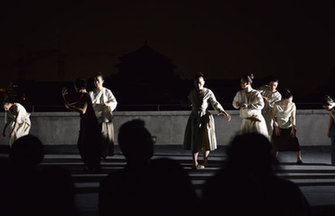
 A quiet designer
A quiet designer
 Alibaba founder biopic could be underway
Alibaba founder biopic could be underway
 Star Stefanie Sun holds concert in Beijing
Star Stefanie Sun holds concert in Beijing
 Faye Wong's manager refutes star's drug rumors
Faye Wong's manager refutes star's drug rumors
Most Viewed
Editor's Picks

|

|

|

|

|

|
Today's Top News
Some protesters in HK decide to withdraw
China startups 'get smart' about healthcare devices
US, India stir S. China Sea debate
Brazilians more aware of breast cancer symptoms, survey finds
Ebola patient in Dallas struggling to survive, says CDC head
Ebola could reach France and UK
China's Xinjiang Corp marks 60th anniversary
19 arrested over clash in Hong Kong
US Weekly

|

|
